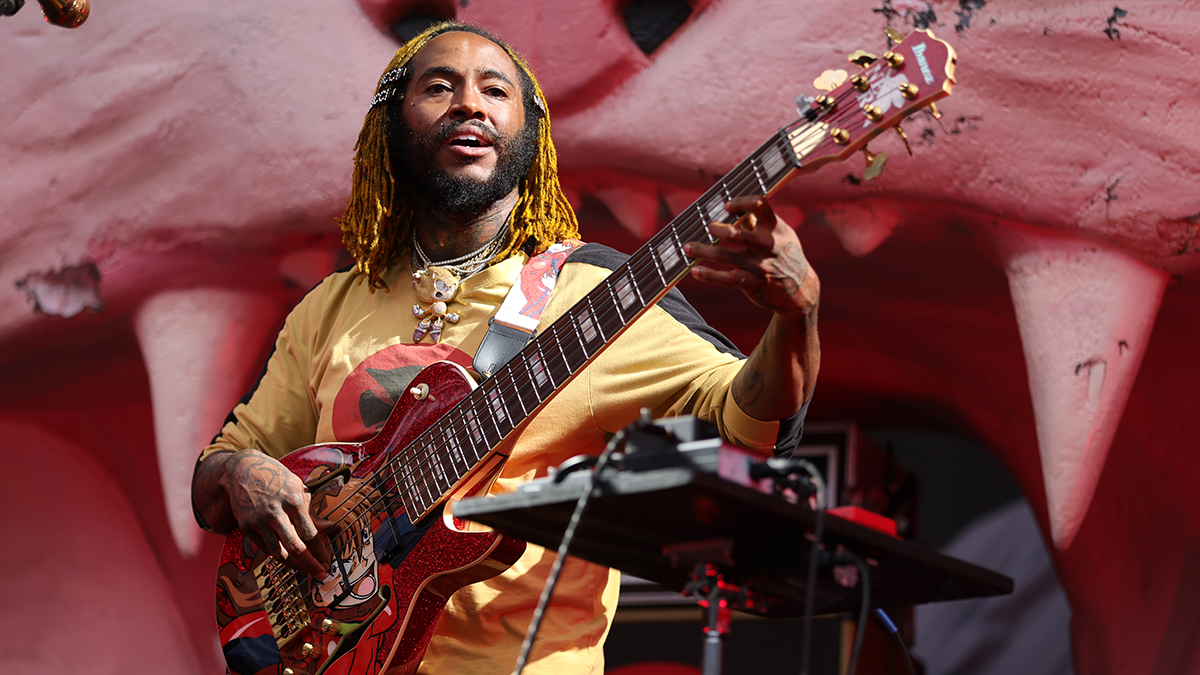Ryan Roxie: "Being in Alice Cooper's band is like being in the trenches. You do a bit of everything, be it playing guitar, singing background vocals, or dodging crazy pieces of the set on stage"
The veteran hard-rock guitarist explains why there's a place for both new and vintage guitars in his collection, and discusses what he thinks of John 5's introduction into the Mötley Crüe fold
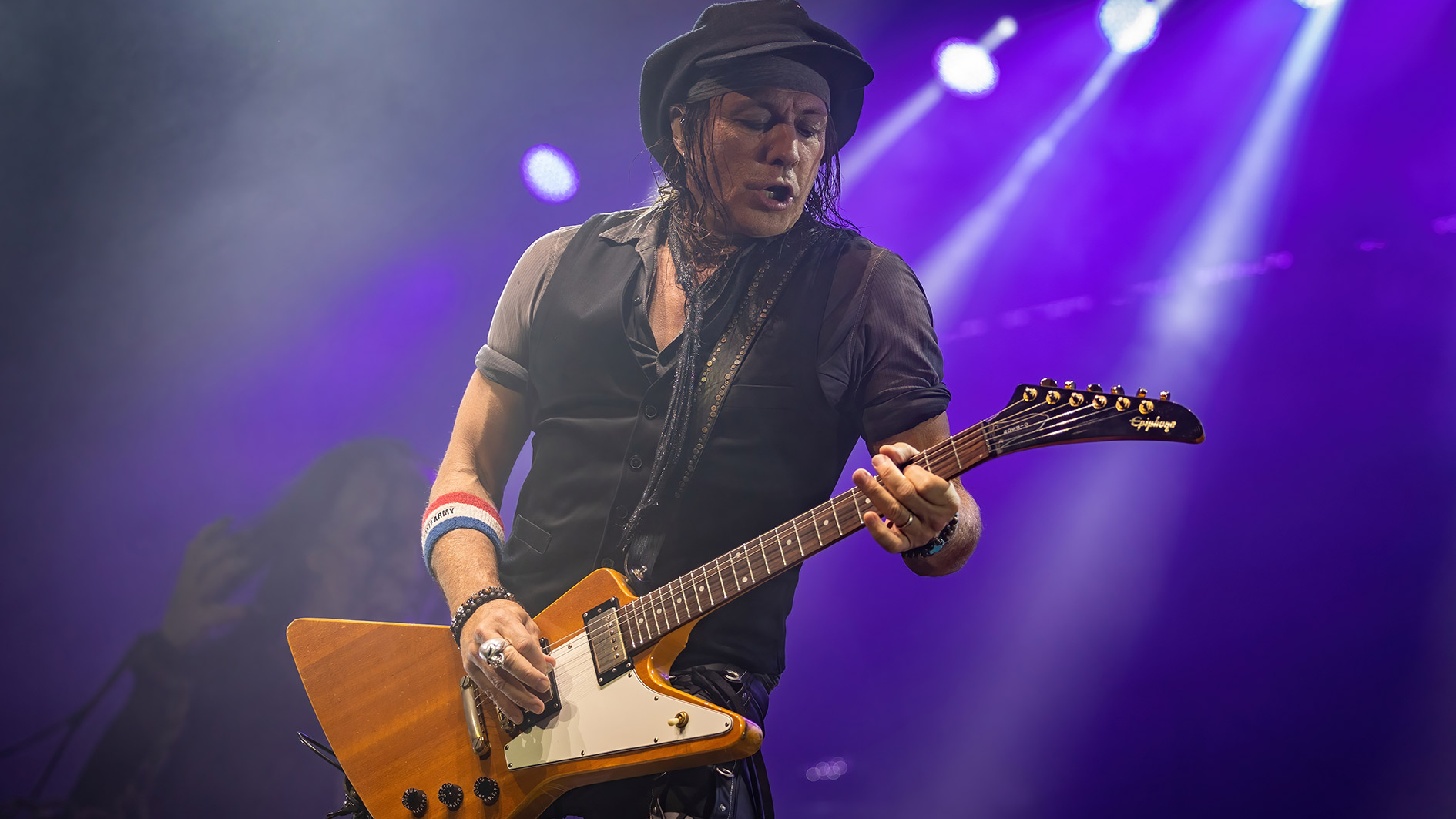
All the latest guitar news, interviews, lessons, reviews, deals and more, direct to your inbox!
You are now subscribed
Your newsletter sign-up was successful
As a long-time member of Alice Cooper's modern-day triple-axe attack, Ryan Roxie provides a steady pentatonic base amongst the bristling chaos.
If we dial back to Roxie's origins, though, fans will be reminded of his tenure with cult act Electric Angels, a retrospectively revered group that sadly got lost in the shuffle. Still, Roxie harbors no regrets or lament due to his flagship band's dissolution; quite the contrary.
“I'm very proud and happy to have been a part of what some refer to as a ‘cult band,’” admits Roxie. “I'm proud, but I would really like to have been part of a hugely successful current commercial success [Laughs].
“Jokes aside, I am so proud of what we did with Electric Angels, man. The guitar tracks I played back then are fun, cool, and hooky. We had all the right ingredients to make it, but there were a lot of things that kept it from happening.”
“I felt that Electric Angels made a great album, representing a new movement of glam music,” Roxie continues. “The problem is that it came out in a sea of hairspray, and don't get me wrong, I doused myself in my share of hairspray [Laughs].
“I guess it's about being in the right place at the right time and on the right label. I thought we had all those things, but maybe we were one of two songs off. Things moved fast in those days, and if you missed the window, it would be closed on you quickly.”
These days, Roxie is bookended by the blazing exploits of Tommy Henriksen, Nita Strauss, and, most recently, Kane Roberts. To that end, Roxie's aim is simple: to harken back to the classic era of Alice Cooper, tidily bringing the veteran shock rocker's '70s endeavors into the modern era.
All the latest guitar news, interviews, lessons, reviews, deals and more, direct to your inbox!
“Being in Alice Cooper's band is like being in the trenches,” Roxie says. “You do a bit of everything, be it playing guitar, singing background vocals, or dodging crazy pieces of the set on stage [Laughs]. But the best part is that we all know our roles. There's no selfishness about it.
“I keep things anchored, Nita or Kane bring the metal fire, and Tommy is the swingman. It works well, and it's why we have such great chemistry no matter what combination of us is up there.”
During a break from the road, Roxie dials in with Guitar World to recount the Alice Cooper band's busy 2022, being a part of a trio of guitarists, his gear preferences, love for vintage guitars, and his thoughts on John 5 joining Mötley Crüe.
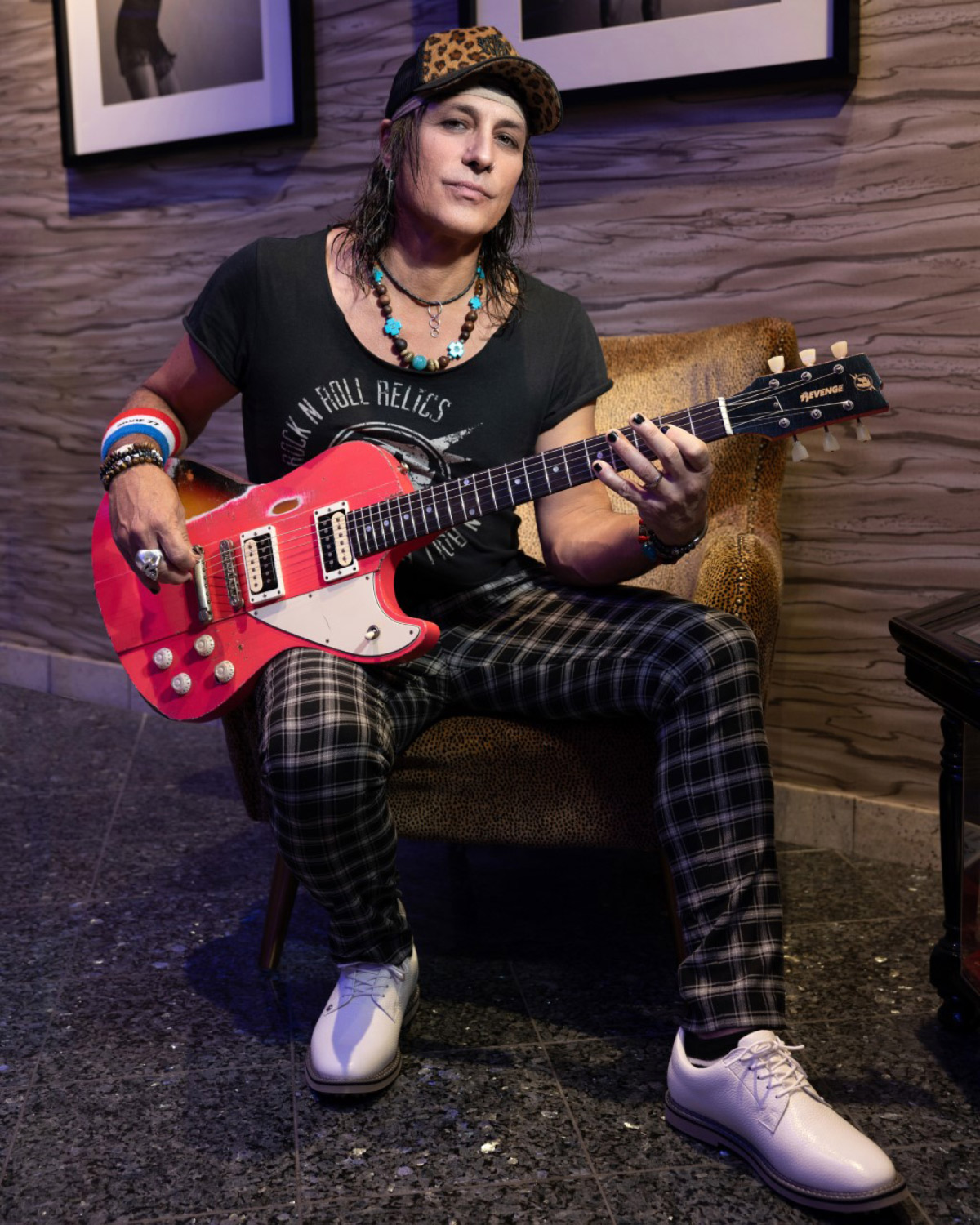
With 2022 in your rear-view mirror, what moments stick out most?
“Probably the proudest moment for me was getting back on a full tour schedule. There was a time when we didn't do it for about a year and a half, and we weren't able to go out, so it was nice to go out on a regular tour schedule like we're used to.
“We started in January and ended on Halloween with the Misfits in Dallas, Texas. I can't think of a better way to end the tour than that. I hope that becomes an annual thing because Alice Cooper is always saying that he owns Halloween, but I think the Misfits give him a run for his money as well [Laughs].”
What challenges did losing Nita Strauss and integrating Kane Roberts into the fold present?
“They both bring such a unique performance aspect. One is the 'Hurricane,' and the other is the 'Monster;' Obviously, I'm gonna miss playing with someone like Nita, with whom I've been side by side for the last eight or nine years, because we know each other's guitar and stage movements so well.
“So, the big thing for me is, 'Okay, what will it be like with another person on stage, being that we know everybody else's moves within the band?' Of course, Kane had to come in and do his own thing, but he also needed to fit in with what we were doing: whips, chains, flying swords, and guillotines [Laughs].
One of the best things about being in the Alice Cooper band as a 'hired gun' is that we don't have to make those hard decisions about who's in the band
“Musically, it's about everybody being prepared because we're all professionals. And I have to say, Kane came in prepared and gave it everything he had. Obviously, you can't recreate anybody in the band, especially someone like Nita, but Kane is his own animal, too.
“But the wonderful thing about playing with Alice Cooper is that he allows each of us to be our own character because he's so secure within his own character, which elevates us all. Everybody gets a moment to shine in the show, and I think Kane shined when his moment came each night.”
Will we see more of Kane Roberts in 2023, or is a return for Nita Strauss in the cards?
“One of the best things about being in the Alice Cooper band as a 'hired gun' is that we don't have to make those hard decisions about who's in the band. All we have to do is make sure that no matter who is in the band, the show is entertaining and that we back up Alice Cooper to the best of our ability while upholding the legacy of that music.
“I defer that to management and, of course, Alice. We'll see what happens, but I don't know if there's anything set in stone yet. Who knows? All I can guarantee is whoever is in that spot will do an incredible job and that we will mesh and rock as a unit. That's what we do and what people have come to expect from us. Hopefully, we deliver on that. I think we do. The fans will let us know if we don't, I guess.
“I can say that I love and am supportive of both. I was in the band with Nita for eight or nine years, so there's history there. And then, when Kane came in, I loved what he brought to the band under some challenging circumstances.
“When he came in, we all completely supported the return of Kane Roberts, which showcased a different era of Alice that the fans love. We'll see what happens. I know some big shows are lined up with Def Leppard and Mötley Crüe, so we'll see who's out there when the time comes.”
How do you view your role amongst the controlled chaos that is an Alice Cooper show?
“I would say controlled chaos is a good way of putting it, but then again, sometimes it's just utter chaos [Laughs]. I view my role as staying true to the attitude of the original Alice Cooper.
“I know that a lot of the Alice Cooper audience come from different eras, with people coming in during Dick Wagner's era and other's coming in when Kane was first in the band back in the '80s.
“But for me, the classic Alice Cooper band is the great guitar riffs of Michael Bruce, Glen Buxton and Dennis Dunaway, played through those songs the original band created. I try to recreate that vibe, not just musically but attitude-wise, every night on stage with Alice.”
There's never really an argument about who's taking a solo; the bottom line is that a lot of the songs have two or three solos, so there's never a shortage
How does the division of guitar-related labor break down on stage?
“It doesn't matter if it's me, Tommy, Nita, Kane, or whoever; we all have a role to play during each song. There's never really an argument about who's taking a solo; the bottom line is that a lot of the songs have two or three solos, so there's never a shortage.
“Also, we all have such different styles, which is also considered when we choose who will do what. For instance, if it's a song from the '80s era, that's tailored more toward someone like Kane or Nita – Kane especially, since he wrote those songs.
“But if we're talking about the classic stuff from the '70s, that's where I get my pentatonic thrills in. And Tommy is someone who can slip in anywhere and pretty much comfortably cover anything that we need.”
The Alice Cooper band has been using Kempers on tour, right? Do you prefer the Kemper, or would you rather have a Marshall stack behind you?
“Well, I use what I guess you'd say is a hybrid of three different types of systems. What happened was that there was just no room for cabinets up there because of the Alice Cooper stage show and all the props. So because of that, we had to remove the cabinets and try something more digital.
“We started experimenting with putting Kempers into the set, and a Hughes & Kettner Black Spirit 200 model, which you can have a cabinet with. We can go straight through the PA as well with that because they have the red box outs, but we've been using the Kempers a lot.
“I still love my Marshall JCM800 setup, and there's always a cabinet on stage, just in case the Kemper does go down. If the digital kicks out, we have the good old Marshall tube amp or the Hughes & Kettner to back us up.
“So, I've been working with all three types as a hybrid over the years, and honestly, I don't have a problem with it. Modeling is great as long as you can get the sounds you need, and the audience feels and hears what I hear in my ears. But you know, I know that although there's a lot of guitarists out there that say they need to feel the air.”
![[L-R] Ryan Roxie and Alice Cooper](https://cdn.mos.cms.futurecdn.net/DKwGZkaQW9kRSELCdMEK7E.jpg)
Kane Roberts told me he needed to get used to not feeling the air of the amp pushing behind him. Was that the case for you, too?
“I can understand that, and I think a lot of guitarists need to feel that rush of air behind them. There's something to be said about that bottom end that only a big amp can give you, and yeah, you don't have them with the Kemper.
“But maybe it's just where I'm positioned on stage because what I hear with my guitar in my in-ears is really nice, full, and has a great bottom end. But I'm also hearing a band mix coming through the side, so I think that maybe I have the luxury of feeling the air from those sounds hitting me as well.”
Are you a pedal and effects junkie?
“Oh, yeah. For sure, I am. Most of the effects I use with Alice are for coloring. I love to add some nice tremolo guitar sounds to a lot of what we do live. One of my favorite effects ever created is what Hughes & Kettner calls the Tube Rotosphere. I loved that and used it for years, but I don't have it anymore.
“I've moved to a Jim Dunlop tremolo, which I think has a really nice sound. I also use the TC Electronic Shaker Vibrato. I'm always looking for new types of tonal things that will give me what I want, like a good boost or delay, and occasionally, a nice clean type of tremolo for the chorus.
But you know what's funny, my favorite effect will always be a tuner because I play a lot of wrong notes throughout the set, but at least they're always in tune
“Then, hopefully, your sound man will give you a volume boost when you're taking a solo, which helps you stand out and add a bit more gain. Speaking of which, that's my other favorite type of pedal; I guess you could call it a boost. Back in the day, when I played with Slash, I used an MXR M133 Micro Amp with just one knob, if you can remember that one.
“I think Slash used the Boss GE-7 with everything turned up to 10. So, he'd used that for a ton of boost. These days, I like TC Electronic; they make a ton of great effects pedals; one is called the Spark Booster.
“As for inboard gear, the echoes, delays, and some flange are already loaded into the Kemper, which is nice when you're playing in a three-guitar lineup. It keeps those chaos levels at bay. We don't worry about reverb too much because, hopefully, we're playing places big enough to provide their own reverb.
“But you know what's funny, my favorite effect will always be a tuner because I play a lot of wrong notes throughout the set, but at least they're always in tune. [Laughs].”
Do you prefer vintage guitars or new ones?
“I'm lucky enough to have several classic Gibson guitars that I use throughout the set. I love vintage guitars, but new ones can be cool, too. I try to use what sounds best for the song, with the tone of the amp, and also what looks aesthetically pleasing.
“So, for instance, if it's classic Alice Cooper, maybe I'll break out a Gibson ES-335. Or if it's something from the more modern era, maybe I'll bring an Explorer. And I actually have an Epiphone Explorer, which shows that you can play Gibsons and Epiphones back-to-back, and they will sound similar. It doesn't matter if it's a Flying V or a Les Paul; Epiphone makes great guitars.”
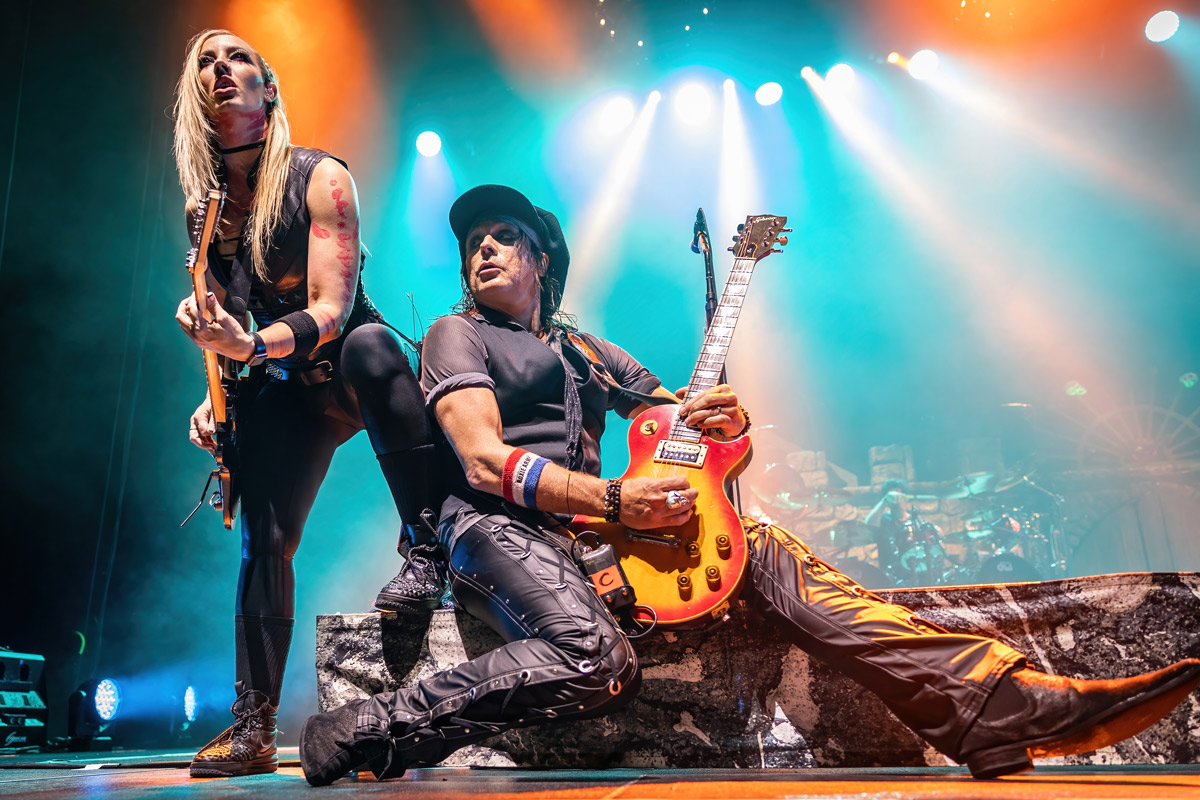
Which of your guitars means the most to you?
“I always go back to my Gibson Les Paul. I'm lucky enough to own a '72 Gibson Goldtop Deluxe with regular humbuckers installed. I call that guitar my girlfriend. I love that guitar. I also own a '78 Gibson Les Paul Pro Deluxe that has a really lovely, faded cherry burst finish. But lately, my number one has been my Rock N Roll Relics Revenge model guitar.
“They've made two for me so far; they're my signature model called the Roxie Revenge. Like I said, I've got it in two colors, one is a one-off colored white type thing, and the other is what they call ‘Jet Pink.’ It's a guitar with a cool design that combines a bunch of different models into one but still has its unique look. When people start seeing this on stage more often, it will become a modern classic that people will covet.”
I love big hooks in songs, so no matter if it's in my solo stuff or writing with other people, I've always added those hooky guitar parts alongside some distorted licks
How would you describe the evolution of your guitar style compared to your days with Electric Angels?
“I'm more refined now and experienced, which makes me better. But I'm still playing the same three chords; I can tell you that. A, D, and E never go out of style, apparently [Laughs].
“Honestly, I've always been a fan of guitar-driven pop, and that's always been a part of my guitar style. And I know that 'pop' has a very different meaning depending on who hears it, but I grew up on AM radio in an age when AM radio played rock 'n' roll. So, my version of pop was hearing the Commodores next to Cheap Trick next to Aerosmith, and then back to the Bee Gees or the Ohio Players.
“I love big hooks in songs, so no matter if it's in my solo stuff or writing with other people, I've always added those hooky guitar parts alongside some distorted licks. All my favorite guitarists, to be honest with you, are the guys who flew under the radar.
“So, it's a proud moment for me to be able to deliver the goods as they do. Guys like Steve Stevens are a perfect example of what I strive to do. He can come up with great hooks that make a song memorable, and that's what I've always been attracted to. I think that's something that's always been represented in my playing.”
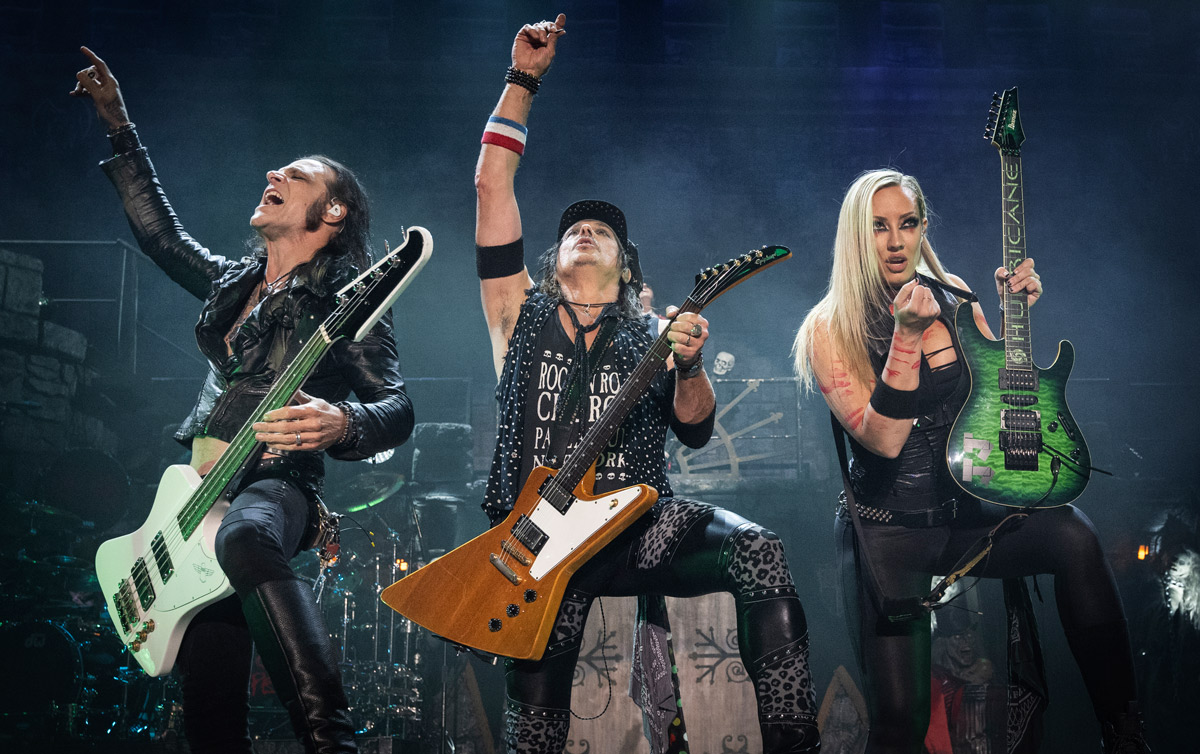
You mentioned Mötley Crüe earlier; as you prepare to head out with them in 2023, what are your thoughts on John 5 replacing Mick Mars?
“John 5 is one of those guitar players who could probably join literally any band and get it done. I know that John 5 will take the opportunity of being able to play the classic Mötley Crüe songs night after night in a stadium setting and make the most of it. I think he will also pay homage to Mick Mars and approach the songs with the utmost respect to Mick.
“All anyone has to do is look at John's history and see all the different people he's played with and styles he's done, and you'll see he can handle it. I think he will uphold the legacy of the songs but also add his own flavor when it's his time to shine. But I think, for the most part, he's not going to mess with anything; he's going to make Mötley Crüe sound like Mötley Crüe.
“Fans want the band to be the best version possible. So, if Mick can't do it for health reasons, I am sure John 5 will give the fans what we want. I don't think anyone will forget Mick Mars, but I believe that John 5 will provide a great show.
“Everyone knows how great Mick Mars is and how much he's contributed to the legacy of rock; that's a given. But if Mick can't perform at the level he feels is needed to represent Mötley Crüe, then I'm sure John 5 will give fans the best version of Motley he can. And if he doesn't, I'll let him know! But I won't need to; I am sure that John has got this.”
Andrew Daly is an iced-coffee-addicted, oddball Telecaster-playing, alfredo pasta-loving journalist from Long Island, NY, who, in addition to being a contributing writer for Guitar World, scribes for Bass Player, Guitar Player, Guitarist, and MusicRadar. Andrew has interviewed favorites like Ace Frehley, Johnny Marr, Vito Bratta, Bruce Kulick, Joe Perry, Brad Whitford, Tom Morello, Rich Robinson, and Paul Stanley, while his all-time favorite (rhythm player), Keith Richards, continues to elude him.


